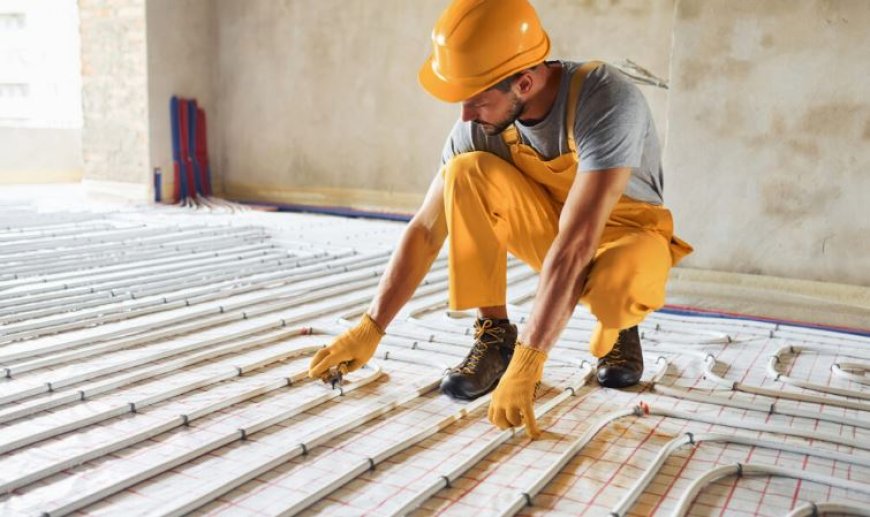The Role of Smart Plumbing Systems in Modern Homes
As technology continues to infiltrate nearly every aspect of our daily lives, the home has become one of the most fertile grounds for innovation.

As technology continues to infiltrate nearly every aspect of our daily lives, the home has become one of the most fertile grounds for innovation. From smart lighting to AI-powered security systems, the idea of a connected, intelligent home is quickly becoming a reality. One of the more transformative, yet often overlooked, areas of this evolution is smart plumbing. These systems are revolutionizing how homeowners interact with and manage water usage, safety, and efficiency. In the context of modern sustainability, convenience, and preventative maintenance, smart plumbing systems are emerging as vital components of intelligent home design.
What Are Smart Plumbing Systems?
Smart plumbing systems incorporate sensors, internet connectivity, and automation to monitor and control water flow and usage throughout a building. These systems can detect leaks, prevent water damage, optimize water consumption, and even provide analytics on usage patterns. The central idea is to enhance efficiency, ensure safety, and reduce waste through intelligent management.
Common components of a smart plumbing system include:
- Leak Detectors: Placed near sinks, toilets, water heaters, and pipes, these sensors send alerts when moisture is detected.
- Smart Water Shutoff Valves: These devices can automatically cut off water flow when a leak is detected, preventing major water damage.
- Water Usage Monitors: These track water consumption in real time, helping homeowners understand and manage usage.
- Smart Faucets and Showers: These can be programmed to use specific water temperatures and flow rates, improving both comfort and efficiency.
Water Conservation and Sustainability
One of the most significant contributions of smart plumbing systems is their role in promoting sustainability. Water is an increasingly scarce resource in many parts of the world. The ability to monitor and optimize its use is critical for long-term environmental stewardship.
According to the Environmental Protection Agency (EPA), household leaks can waste nearly 1 trillion gallons of water annually in the United States alone (source). Smart leak detection and water monitoring systems play a crucial role in addressing this issue. By alerting homeowners to leaks immediately—or even shutting off the water automatically—smart systems can prevent this kind of massive waste.
Additionally, real-time monitoring helps households become more aware of their consumption patterns. By reviewing usage analytics, homeowners can make informed decisions to reduce consumption. Some systems can even detect inefficiencies, like a toilet that runs intermittently due to a faulty flapper, and suggest repairs.
Prevention of Water Damage
Water damage is one of the most expensive and common forms of property damage. Whether it’s from a burst pipe, a leaking water heater, or an overflowing appliance, the financial and emotional toll of water-related incidents can be significant.
Smart plumbing systems mitigate this risk by offering instant alerts and automatic shutoffs. For example, if a pipe bursts while the homeowner is away, traditional systems would allow water to flow until someone notices—potentially hours or days later. In contrast, a smart shutoff valve detects abnormal flow patterns and cuts off the supply in seconds.
Insurance companies are taking notice of these advancements. Many now offer discounts to homeowners who install smart leak detection systems, recognizing the reduced risk of claims. Some insurers even partner with tech companies to provide devices at reduced costs or as part of home insurance packages.
Enhanced Convenience and Comfort
Smart plumbing also adds a layer of luxury and convenience that aligns with the expectations of modern homeowners. Imagine a shower that starts at your preferred temperature, a faucet that dispenses the exact amount of water you need, or a system that alerts you if someone leaves a tap running.
Smart showers, for example, allow users to program different settings for each family member. These systems can be activated by voice command or app, providing personalized experiences while minimizing water waste. Similarly, smart toilets and bidets can offer self-cleaning, heated seats, and automated flushing—all managed via mobile app or home assistant.
Voice-controlled faucets are also growing in popularity. These systems integrate with smart home ecosystems like Amazon Alexa or Google Home, allowing users to say commands like “fill the kettle with 2 cups of water” or “turn off the kitchen tap.”
Integration with Broader Smart Home Systems
Another major advantage of smart plumbing is its ability to integrate with other smart systems within the home. When connected with a broader smart ecosystem, plumbing systems can respond dynamically to changing conditions or user habits.
For instance, if a home security system detects that no one is present, it can instruct the plumbing system to shut off water to certain areas. Or, a home energy management system could use water usage data to optimize when the washing machine runs, coordinating with peak electricity times to reduce utility bills.
This level of integration leads to a more holistic, automated, and efficient household. As more smart appliances enter the market, the demand for such interconnected functionality is only expected to grow.
Economic Considerations and Long-Term Savings
While the initial investment in smart plumbing systems can be significant, the long-term economic benefits often outweigh the costs. Preventing a single major water leak can save thousands of dollars in damage repair. Lower water usage results in reduced utility bills, and preventative maintenance extends the lifespan of plumbing infrastructure.
Moreover, as water costs continue to rise and building codes increasingly favor sustainability, smart plumbing systems can enhance a property's market value. In fact, a study from Zillow found that homes with smart home features, including water-saving and leak prevention technologies, sell for up to 5% more than comparable homes without them (source).
For developers and real estate investors, this presents a compelling case. Incorporating smart plumbing into new builds or renovations not only appeals to environmentally conscious buyers but also serves as a hedge against rising costs and future regulatory changes.
Challenges and Considerations
Despite the advantages, adopting smart plumbing technology is not without its challenges. One major concern is the reliability of sensors and connectivity. A false alarm or connectivity issue can lead to inconvenience or even prevent the system from functioning during a critical event.
Cybersecurity is another concern. As with any IoT (Internet of Things) system, smart plumbing systems are potentially vulnerable to hacking. A compromised system could lead to misuse, data breaches, or unauthorized control of home infrastructure. Therefore, strong encryption, secure networks, and regular updates are essential for safe operation.
Additionally, the cost of installation and retrofitting can be a barrier for some homeowners. While new constructions can seamlessly integrate smart plumbing into the design, older homes may require significant upgrades to existing infrastructure.
The Future of Smart Plumbing
Looking ahead, the field of smart plumbing is poised for rapid growth and innovation. Advances in AI and machine learning are enabling more sophisticated systems that can predict maintenance needs before problems occur. For example, future systems could detect early signs of pipe corrosion or mineral buildup, prompting action before a leak ever forms.
Water quality monitoring is another area of development. Sensors are being designed to detect contaminants such as lead, chlorine, or bacteria, providing real-time data about water safety and suggesting filtration when needed.
There’s also movement toward greater standardization and interoperability. As more manufacturers enter the market, there's a push to develop open-source platforms and universal communication standards that allow different devices to work seamlessly together.
Finally, integration with smart city infrastructure could enable broader water management strategies. Imagine a network of smart homes sharing data with municipal systems to help detect citywide leaks, manage water pressure, or even respond to drought conditions in real time.
Conclusion
Smart plumbing systems are no longer just futuristic gadgets for tech enthusiasts—they're becoming essential tools for modern living. By conserving water, preventing damage, improving comfort, and integrating with other smart systems, these technologies offer a compelling mix of practicality and innovation. As environmental concerns grow and homeowners seek greater convenience and efficiency, the adoption of smart plumbing is set to rise.
With ongoing advancements in sensor technology, AI, and connectivity, the smart plumbing systems of today are just the beginning. Tomorrow’s homes will be not only intelligent but also proactive in how they manage one of our most precious resources: water.
What's Your Reaction?
 Like
0
Like
0
 Dislike
0
Dislike
0
 Love
0
Love
0
 Funny
0
Funny
0
 Angry
0
Angry
0
 Sad
0
Sad
0
 Wow
0
Wow
0









































